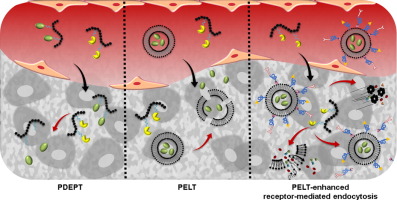Advanced Drug Delivery Reviews ( IF 15.2 ) Pub Date : 2017-09-12 , DOI: 10.1016/j.addr.2017.09.011 Anna Scomparin , Helena F. Florindo , Galia Tiram , Elaine L. Ferguson , Ronit Satchi-Fainaro

|
Polymer-directed enzyme prodrug therapy (PDEPT) and polymer enzyme liposome therapy (PELT) are two-step therapies developed to provide anticancer drugs site-selective intratumoral accumulation and release. Nanomedicines, such as polymer-drug conjugates and liposomal drugs, accumulate in the tumor site due to extravasation-dependent mechanism (enhanced permeability and retention – EPR – effect), and further need to cross the cellular membrane and release their payload in the intracellular compartment. The subsequent administration of a polymer-enzyme conjugate able to accumulate in the tumor tissue and to trigger the extracellular release of the active drug showed promising preclinical results. The development of polymer-enzyme, polymer-drug conjugates and liposomal drugs had undergone a vast advancement over the past decades. Several examples of enzyme mimics for in vivo therapy can be found in the literature. Moreover, polymer therapeutics often present an enzyme-sensitive mechanism of drug release. These nanomedicines can thus be optimal substrates for PDEPT and this review aims to provide new insights and stimuli toward the future perspectives of this promising combination.
中文翻译:

癌症的两步聚合酶和脂质体酶前药疗法:PDEPT和PELT概念以及未来前景
聚合物导向的酶前药疗法(PDEPT)和聚合物酶脂质体疗法(PELT)是两步疗法,旨在为抗癌药物提供部位选择性的肿瘤内蓄积和释放。纳米药物,例如聚合物-药物缀合物和脂质体药物,由于外渗依赖性机制(增强的渗透性和保留-EPR-效应)而积聚在肿瘤部位,并且进一步需要穿过细胞膜并在细胞内区室释放其有效载荷。随后施用能够在肿瘤组织中积聚并触发活性药物在细胞外释放的聚合物-酶结合物显示出令人鼓舞的临床前结果。在过去的几十年中,聚合物酶,聚合物药物偶联物和脂质体药物的开发取得了长足的进步。用于体内治疗的酶模拟物的几个例子可以在文献中找到。而且,聚合物治疗剂通常表现出药物释放的酶敏感性机制。这些纳米药物因此可能是PDEPT的最佳底物,本综述旨在为这种有前途的组合的未来前景提供新的见解和刺激。





















































 京公网安备 11010802027423号
京公网安备 11010802027423号